(完整)英语专升本易混词汇辨析总结,推荐文档
- 格式:doc
- 大小:64.02 KB
- 文档页数:19
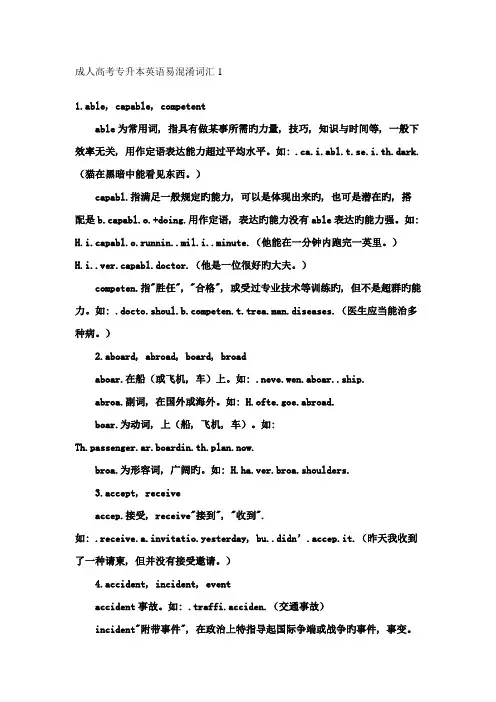
成人高考专升本英语易混淆词汇11.able, capable, competentable为常用词, 指具有做某事所需旳力量, 技巧, 知识与时间等, 一般下效率无关, 用作定语表达能力超过平均水平。
如: .ca.i.abl.t.se.i.th.dark.(猫在黑暗中能看见东西。
)capabl.指满足一般规定旳能力, 可以是体现出来旳, 也可是潜在旳, 搭配是b.capabl.o.+doing.用作定语, 表达旳能力没有able表达旳能力强。
如: .i..minute.(他能在一分钟内跑完一英里。
)H.i..ver.capabl.doctor.(他是一位很好旳大夫。
)competen.指"胜任", "合格", 或受过专业技术等训练旳, 但不是超群旳能力。
如: peten.t.trea.man.diseases.(医生应当能治多种病。
)2.aboard, abroad, board, broadaboar.在船(或飞机, 车)上。
如: .neve.wen.aboar..ship.abroa.副词, 在国外或海外。
如: H.ofte.goe.abroad.boar.为动词, 上(船, 飞机, 车)。
如:Th.passenger.ar.boardin.th.plan.now.broa.为形容词, 广阔旳。
如: H.ha.ver.broa.shoulders.3.accept, receiveaccep.接受, receive"接到", "收到".如: .receive.a.invitatio.yesterday, bu..didn’.accep.it.(昨天我收到了一种请柬, 但并没有接受邀请。
)4.accident, incident, eventaccident事故。
如: .traffi.acciden.(交通事故)incident"附带事件", 在政治上特指导起国际争端或战争旳事件, 事变。
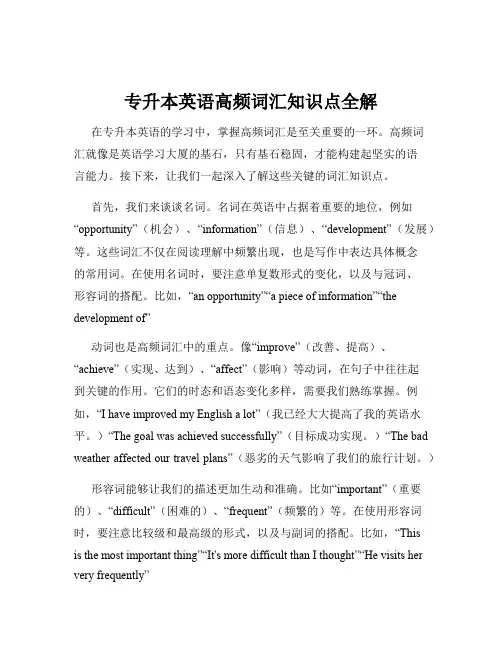
专升本英语高频词汇知识点全解在专升本英语的学习中,掌握高频词汇是至关重要的一环。
高频词汇就像是英语学习大厦的基石,只有基石稳固,才能构建起坚实的语言能力。
接下来,让我们一起深入了解这些关键的词汇知识点。
首先,我们来谈谈名词。
名词在英语中占据着重要的地位,例如“opportunity”(机会)、“information”(信息)、“development”(发展)等。
这些词汇不仅在阅读理解中频繁出现,也是写作中表达具体概念的常用词。
在使用名词时,要注意单复数形式的变化,以及与冠词、形容词的搭配。
比如,“an opportunity”“a piece of information”“the development of”动词也是高频词汇中的重点。
像“improve”(改善、提高)、“achieve”(实现、达到)、“affect”(影响)等动词,在句子中往往起到关键的作用。
它们的时态和语态变化多样,需要我们熟练掌握。
例如,“I have improved my English a lot”(我已经大大提高了我的英语水平。
)“The goal was achieved successfully”(目标成功实现。
)“The bad weather affected our travel plans”(恶劣的天气影响了我们的旅行计划。
)形容词能够让我们的描述更加生动和准确。
比如“important”(重要的)、“difficult”(困难的)、“frequent”(频繁的)等。
在使用形容词时,要注意比较级和最高级的形式,以及与副词的搭配。
比如,“Thisis the most important thing”“It's more difficult than I thought”“He visits her very frequently”接下来是副词,“frequently”(频繁地)、“carefully”(仔细地)、“probably”(可能地)等副词常常用来修饰动词、形容词或整个句子。
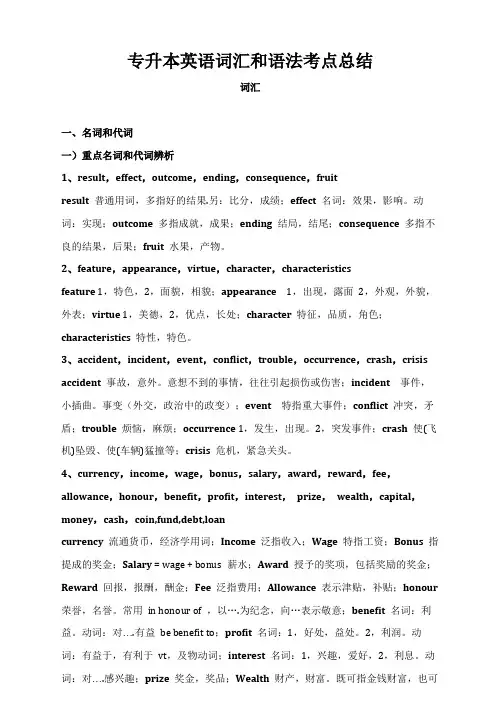
专升本英语词汇和语法考点总结词汇一、名词和代词一)重点名词和代词辨析1、result,effect,outcome,ending,consequence,fruitresult 普通用词,多指好的结果.另:比分,成绩;effect 名词:效果,影响。
动词:实现;outcome 多指成就,成果;ending 结局,结尾;consequence 多指不良的结果,后果;fruit 水果,产物。
2、feature,appearance,virtue,character,characteristicsfeature 1,特色,2,面貌,相貌;appearance1,出现,露面2,外观,外貌,外表;virtue 1,美德,2,优点,长处;character特征,品质,角色;characteristics特性,特色。
3、accident,incident,event,conflict,trouble,occurrence,crash,crisis accident 事故,意外。
意想不到的事情,往往引起损伤或伤害;incident事件,小插曲。
事变(外交,政治中的政变);event 特指重大事件;conflict冲突,矛盾;trouble烦恼,麻烦;occurrence 1,发生,出现。
2,突发事件;crash使(飞机)坠毁、使(车辆)猛撞等;crisis危机,紧急关头。
4、currency,income,wage,bonus,salary,award,reward,fee,allowance,honour,benefit,profit,interest,prize,wealth,capital,money,cash,coin,fund,debt,loancurrency 流通货币,经济学用词;Income泛指收入;Wage 特指工资;Bonus指提成的奖金;Salary = wage + bonus 薪水;Award授予的奖项,包括奖励的奖金;Reward 回报,报酬,酬金;Fee泛指费用;Allowance 表示津贴,补贴;honour 荣誉,名誉。
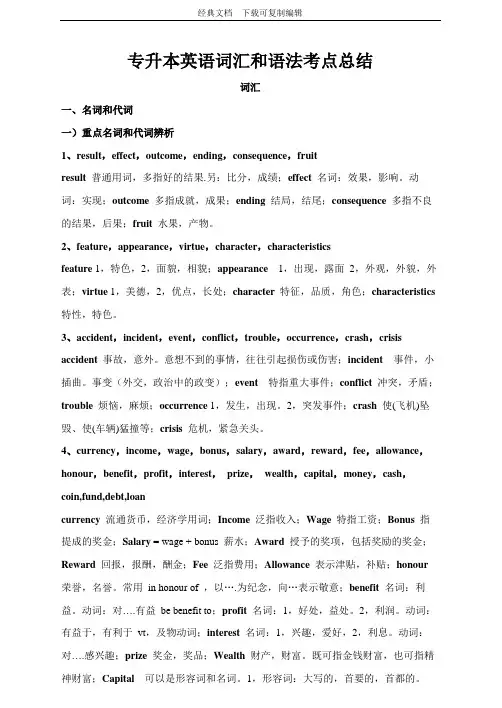
专升本英语词汇和语法考点总结词汇一、名词和代词一)重点名词和代词辨析1、result,effect,outcome,ending,consequence,fruitresult 普通用词,多指好的结果.另:比分,成绩;effect 名词:效果,影响。
动词:实现;outcome 多指成就,成果;ending 结局,结尾;consequence 多指不良的结果,后果;fruit 水果,产物。
2、feature,appearance,virtue,character,characteristicsfeature 1,特色,2,面貌,相貌;appearance1,出现,露面2,外观,外貌,外表;virtue 1,美德,2,优点,长处;character特征,品质,角色;characteristics 特性,特色。
3、accident,incident,event,conflict,trouble,occurrence,crash,crisis accident 事故,意外。
意想不到的事情,往往引起损伤或伤害;incident事件,小插曲。
事变(外交,政治中的政变);event 特指重大事件;conflict冲突,矛盾;trouble烦恼,麻烦;occurrence 1,发生,出现。
2,突发事件;crash使(飞机)坠毁、使(车辆)猛撞等;crisis危机,紧急关头。
4、currency,income,wage,bonus,salary,award,reward,fee,allowance,honour,benefit,profit,interest,prize,wealth,capital,money,cash,coin,fund,debt,loancurrency 流通货币,经济学用词;Income泛指收入;Wage 特指工资;Bonus指提成的奖金;Salary = wage + bonus 薪水;Award授予的奖项,包括奖励的奖金;Reward 回报,报酬,酬金;Fee泛指费用;Allowance 表示津贴,补贴;honour 荣誉,名誉。
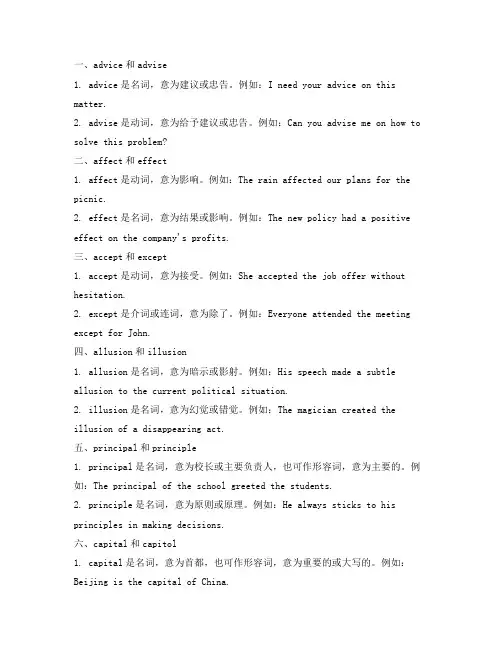
一、advice和advise1. advice是名词,意为建议或忠告。
例如:I need your advice on this matter.2. advise是动词,意为给予建议或忠告。
例如:Can you advise me on how to solve this problem?二、affect和effect1. affect是动词,意为影响。
例如:The rain affected our plans for the picnic.2. effect是名词,意为结果或影响。
例如:The new policy had a positive effect on the company's profits.三、accept和except1. accept是动词,意为接受。
例如:She accepted the job offer without hesitation.2. except是介词或连词,意为除了。
例如:Everyone attended the meeting except for John.四、allusion和illusion1. allusion是名词,意为暗示或影射。
例如:His speech made a subtle allusion to the current political situation.2. illusion是名词,意为幻觉或错觉。
例如:The magician created the illusion of a disappearing act.五、principal和principle1. principal是名词,意为校长或主要负责人,也可作形容词,意为主要的。
例如:The principal of the school greeted the students.2. principle是名词,意为原则或原理。
例如:He always sticks to his principles in making decisions.六、capital和capitol1. capital是名词,意为首都,也可作形容词,意为重要的或大写的。
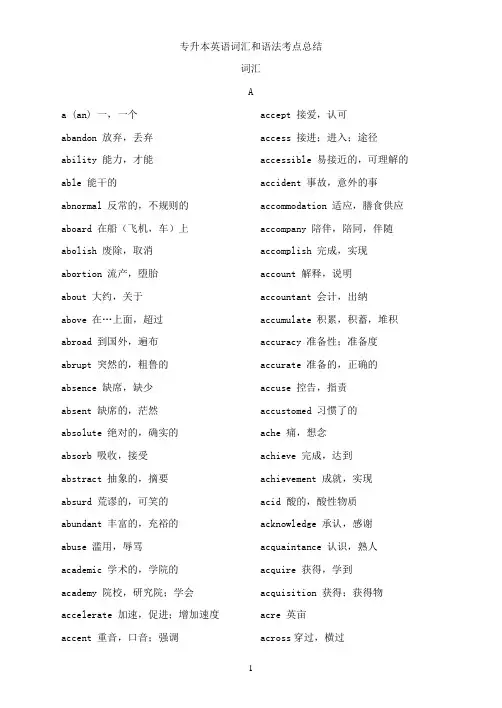
专升本英语词汇和语法考点总结词汇Aa (an) 一,一个abandon 放弃,丢弃ability 能力,才能able 能干的abnormal 反常的,不规则的aboard 在船(飞机,车)上abolish 废除,取消abortion 流产,堕胎about 大约,关于above 在…上面,超过abroad 到国外,遍布abrupt 突然的,粗鲁的absence 缺席,缺少absent 缺席的,茫然absolute 绝对的,确实的absorb 吸收,接受abstract 抽象的,摘要absurd 荒谬的,可笑的abundant 丰富的,充裕的abuse 滥用,辱骂academic 学术的,学院的academy 院校,研究院;学会accelerate 加速,促进;增加速度accent 重音,口音;强调accept 接爱,认可access 接进;进入;途径accessible 易接近的,可理解的accident 事故,意外的事accommodation 适应,膳食供应accompany 陪伴,陪同,伴随accomplish 完成,实现account 解释,说明accountant 会计,出纳accumulate 积累,积蓄,堆积accuracy 准备性;准备度accurate 准备的,正确的accuse 控告,指责accustomed 习惯了的ache 痛,想念achieve 完成,达到achievement 成就,实现acid 酸的,酸性物质acknowledge 承认,感谢acquaintance 认识,熟人acquire 获得,学到acquisition 获得;获得物acre 英亩across穿过,横过act 行动,表演active积极的,活动的activity活动,活动性actor演员,男演员actress女演员actual 实际的,现行的acute尖的,急性的AD 公元;广告ad= advertisement 广告,做广告adapt使适应,改编adaptation改编,适应add 加,进一步说(或写)addicted 沉溺的,上瘾的addition 加法,增加address地址,住址adequate充足的,任任的adjust调整,校整,适应于adjustment 调整,校整administration管理,经营,行政admirable可赞赏的,堂堂的admire羡慕,钦佩admission 允许进入,入场费admit 承认,接纳adolescence 青春期,青少年adolescent 青少年的,青春期的adopt 采取,收养ore 崇拜,热爱ad adult 成的人的,已成熟的advance促进,提高,advantage 优势,利益adventure 冒险,奇遇advertisement 广告,登广告advice 劝告,意见advise 劝告,建议,通知advocate提倡,提倡者affair事情,事务affect 影响,感动affection 爱,感情,作用afford 提供,负担的起afraid 害怕的,恐怕Africa 非洲African非洲的,非洲人的after 在……后面,后来afternoon下午,午后afterward(s) 然后,后来again再,又,此外against反对;倚靠age 年龄,时代agenda 议程,议事日程agent 代理人,代理商aggressive 侵略的,有进取心的ago 以前,……前agree 赞同,一致,约定agreement 协议,同意agricultural 农业的,农艺的agriculture 农业,农艺;农学ahead 在前,向前,提前aid 帮助,救护AIDS 爱滋病aim 企图,瞄准air 天空,大气;样子aircraft 飞机,飞艇airline 航线,航空公司airmail 航空邮件,航空邮政airplane 飞机airport 机场,航空港airspace 空气,空间,上空alarm 惊恐;警报album 粘贴薄;相册;文选alcohol 酒精alcoholic 酒精的algebra 代数学,代数alike 相似的,相象的alive 活着的,有活力的all 全部的,完全地allergic 过敏的,极讨厌的alley 小径,胡同allocate分配,把……拨给allow 允许,承认,考虑到allowance 允许,准许,almost 几乎,大概alone 单独的,唯一的along 沿着,向前alongside 在旁边,横靠aloud 出声地,大声地alphabet 字母表already 已,已经also 也,同样;而且alternative两者选一的;交替的although 尽管,虽然altitude 高度,高处altogether 完全,全部,总共aluminium 铝always 总是,一直,永远am是am. / am, AM. / AM 上午amateur 业余的,业余爱好者amazing 令人惊异的America美国,美洲ambassador (ambassadress) 大使,使节ambiguous 暧昧的,不明确的ambition 野心,抱负ambulance 救护车;野战医院among 在……中间amount 数量,总计ample 充分的,足够的amuse 逗乐,使……开心amusement 娱乐,消谴analyse 分析,分解analysis 分析,解析ancestor 祖先,祖宗ancient 古代的,古老的and 和;并且;那么anecdote 轶闻,轶事anger 愤怒,使……发怒angle 角,角度,观点angry 愤怒的;生气的animal 动物;肉欲的ankle 踝,脚脖子anniversary 周年,周年纪念日announce 宣布,发表annoy 使生气,使恼火annual 每年的,年报another 另一;别的answer 回答,答复ant 蚂蚁Antarctic 南极的;南极区antique 古代的,古物anxiety 焦虑,担心anxious 焦虑的,渴望的any 一些,任何anybody 任何人,无论谁anyhow 无论如何;总之anyone 无论谁,任何人anything 任何事,一切anyway 不管怎样说,总之anywhere 无论哪里,任何地方apart 分开,相距apartment 房间apologize 道歉;辩解apology 道歉;辩护apparent 表面的,显然的appeal 请求,呼吁,上诉appear 出现,显露appearance显露,外观appendix 附录;附属物appetite 胃口;爱好;欲望applaud 喝彩,欢呼apple 苹果,苹果树applicant 申请人application 申请,申请表,实用apply 申请,应用appoint 任命,委派,指定appointment 约会,认命appreciate 欣赏,鉴别appreciation 欣赏,鉴别approach 接近,走近,处理appropriate 适当的,拨款,占用approval 同意,赞成,批准approve 赞成,同意,批准approximately 近似的,大约apron 围裙arbitrary 任意的,武断的,专断的arch 拱形,用拱连接architect 建筑师,设计师architecture 建筑,建筑学Arctic 北极,北极的are 是area 空地,面积argue 争辩,辩论argument 争论,论点arise (arose, arisen) 出发,发生,由……引起arithmetic 算术,四则运算arm 手臂,武装armchair 扶手椅army 军队,大群around 周围,到处,大约arrange 安排,整理arrangement 排列,整理arrest 逮捕;惹人注目的arrival 到达,到达者arrive 到达,抵达;到来arrow 箭,箭头号art 艺术,美术article 文章,论文artificial 人工的,人造的artist 艺术家,美术家as 同样的;像……一样ash 灰,灰末;骨灰ashamed 羞耻;惭愧Asia 亚洲Asian 亚洲人aside 在旁边ask 询问,请求asleep 睡着的,熟睡aspect 样子,而貌assess 估定,评定assessment 估价,评价assist 援助,帮助assistance 帮助,援助assistant 助手,助教;帮助的associate 把……联系在一起;交往association 联合,交往assume 假定,承担assumption 假定,设想astonish 使惊讶的,使吃惊的astronaut 太空人,宇航员astronomer 天文学家astronomy 天文学at 在,向,对athlete 运动员,田径运动员athletic 运动的,体育的Atlantic 大西洋的,大西洋atmosphere 大气压,环境,气氛atom 原子,微量attach 固定住,附加attack 固定住,附加attain 达到,获得,完成attempt 尝试,试图attend 出席,参加,照顾attention 注意,留意,立正attitude 姿势,态度attract 吸引,引诱attraction 吸引,吸引力attractive 迷人的,引人注意的audience 听众,观众,读者aunt 姨母,姑母,伯母……authentic 真的,原作的,可靠的author 作家,作者,创造者authority 官方,当局,权力automatic 自动的机器autonomous 自主的,自治的autumn 秋,秋季available 可利用的,可得到的avenue 大街,途径average 平均,平均的avoid 避免,回避,逃避awake (awoke, awoken)award 唤醒,醒来,醒着的aware 意识到,知道的away 离开,远离awesome 可怕的awful 可怕的,讨厌的awkward 尴尬的,笨拙的Bbaby 婴儿,孩子气的bachelor 单身汉back 背部,后面的background 背景,后景,经历backward(s) 向后地,相反地bacon 咸肉bacterium 细菌bad (worse, worst) 坏的,有害的badminton 羽毛球bag 包,口袋baggage 行李bakery 面包店balance 使平衡;天平balcony 阳台,二楼包厢ball 球,舞会ballet 芭蕾舞balloon 气球,使成气球状bamboo 竹子ban 禁止,取缔banana 香蕉band 带,乐队,一伙bandage 绷带,包扎bank 银行;岸bar 条,棒;酒吧barbecue 烤肉架barber 理发师barbershop 理发店bare 赤裸的;仅仅的bargain 交议;便宜货bark 吠叫,咆哮barrier 栅栏;障碍base 基础;基地baseball 棒球,棒球运动basement 地下室,底部basic 基础的,根本的,主要的basin 盆,洗脸盆basis 基础,主要成分basket 筐,篮,篓basketball 篮球bat 球棒;击球bath 洗澡;浴室bathe 给……洗澡;弄湿bathroom 浴室,卫生间bathtub 浴缸battery 电池,一系列battle 战役,斗争bay 海湾,阻挡B. C. 一(个);每一(个)be (am, is, are, was, were, being, been)是beach 海滩,河滩bean 豆,蚕豆bean curd 豆腐bear1 熊,粗鲁的人bear2 忍受beard 胡须,络腮胡子beast 兽类;凶残的人beat (beat, beaten) 打击;心跳beautiful 美丽的,美好的beauty 美,美人because 因为become (became, become) 成为,变得bed 床;河床beddings 寝具bedroom 卧室bee 蜜蜂;忙碌的人beef 牛肉;发牢骚beer 啤酒before 以前;在……前面beg 乞讨;请求begin (began, begun) 开始behalf 利益,唯护behave 行为,举止behaviour 习行;习性behind 在…后面;落后于being 存在,生存;生物belief 相信;信仰believe 相信,认为bell 铃,钟声belly 肚子;腹部belong 属于,应归入below 在…下面;到下面belt 腰带;地带bench 长凳;(工作)台bend (bent, bent) (使)弯曲,屈服beneath 在…下面;在下方beneficial 有利的;有益的benefit 利益;津贴;有益于bent 嗜好,倾向;下决心的beside 在…旁边;在…附近besides 除…之外;而且betray 出卖,背叛;暴露between 中间;在(两者)之间beyond 在…之外;超出bicycle 自行车,脚踏车bid 报价,投标;出价big 大的,重要的;大量地bike=bicycle 自行车bill 账单;票据;钞票;法案bingo 一种赌博游戏biochemistry 生物化学biography 传记biology 生物学;生态学bird 鸟,禽类birth 出生;出身;起源birthday 生日;纪念日birthplace 诞生地biscuit 饼干;点心bishop 主教bit 一点;比特;钻头bite (bit, bitten) 咬;刺痛bitter 辛苦的,严寒的black 黑;黑暗的blackboard 黑板blame 责怪;过错blank 空白的;表格blanket 毯子;覆盖层bleed 出血,流血bless 祝福,保佑blind 瞎的;盲目的block 大块;障碍物;赌塞blood 血;血统,出身blouse 女衬衫;童衫blow (blew, blown) 吹;爆炸;吹气blue 蓝色的;忧郁的board 板;委员会boat 小船;划船body 身体;正文boil 沸腾;煮沸bomb 炸弹;轰炸bond 粘合;联合bone 骨头;骨骼bonus 奖金;补贴;红利book 书本;卷;预订boom 繁荣;(发出)隆隆声boot 靴子;解雇booth 货摊;小间border 边缘;和…接界bored 无趣的;烦人的boring 钻孔,挖动born 出生的,天生的borrow 借,借入boss 老板,上司;指挥botanical 植物的botany 植物学both 二者,双方的bother 打扰,麻烦,担心bottle 瓶子,容器bottom 底,底部,根基bounce 反跳,弹起;跳起bound 一定的,有义务的boundary 分界线,边界bow 鞠躬,点头;弓状物bowl 碗,钵;碗状物bowling 保龄球box 盒子,包厢;拳击boxing 拳击(运动)boy 男孩;侍者boycott 联合抵制,罢(课,市等)brain 大脑;心智brake 闸,刹车;减速branch 树枝,分枝;部门brand 烙印;商标;铭记brave 勇敢的,英勇的bravery 勇敢,大胆bread 面包,食物break (broke, broken) 打破,破坏breakfast 早餐;吃早饭breakthrough 突围,突破点breast 乳房,胸脯;奋勇抵抗breath 呼吸;一口气breathe 呼吸,吸入breathe 呼吸,吸入breathless 气喘吁吁的;死的brewery(啤酒)酿造厂brick 砖,方木块bride 新娘bridegroom 新郎bridge 桥,桥梁;桥牌brief 短暂的,简洁的;摘要bright 明亮的;欢快的;聪明的brilliant 明亮的;光辉的;卓越的bring (brought, brought) 带来,引起broad 宽阔的,广泛的broadcast广播,播音brochure 假订本,小册子broken 弄坏的,被打碎的broom 扫帚brother 兄弟,同胞brown 棕色的,褐色的brunch 早午餐brush 刷;刷子;画笔Buddhism 佛教budget 预算;经费buffet 自助餐build (built, built) 建筑,建设building 建筑物,大楼bunch (一)束,串bungalow 平房,小屋burden 负担,载重,义务bureaucratic 官僚的burglar 夜盗,窃贼burn (burnt, burnt或-ed, -ed) 燃烧;烧伤burst 爆炸,破裂bury 掩盖,埋藏bus 公共汽车bush 灌木business 生意;业务;企业businessman/ woman 商人busy 繁忙的;使忙于but 但是;除…之外butcher 屠夫,肉贩;屠杀butter 黄油,奶油butterfly 蝴蝶button 扣子,按纽;紧扣buy (bought, bought) 购买,交易by 被,经,由;经过bye 再见Ccab 出租马车,出租车cabbage 洋白菜,卷心菜café 小餐馆;咖啡厅cafeteria 自助餐厅cage 笼,鸟笼calculate 计划,核算,推测cake 饼,蛋糕;块call 叫做,叫喊;打电话calm 平静的,镇静的camel 骆驼camera 照相机,摄影机camp 野营,营地,扎营campaign 战役,运动can (could); can’t =cannot 能,会,可以modal 形式的;模态的can 筒,罐头canal 运河,沟渠,水道cancel 取消,作废,删除cancer 癌症,肿瘤candidate 候选人,应试者candle 蜡烛candy 糖果canteen 小卖部,临时餐室cap 帽子,帽状物capital 首都;资本;重要的capsule 胶囊,太空舱captain 船长,陆军队长;陆军上尉caption 标题,说明,解说词car 车,汽车,车厢carbon 碳card 卡片,名片,请帖care关心,愿意,照料careful 小心的,仔细的careless 粗心的,疏忽的carpenter 木工,木匠carpet 地毯,训斥carriage马车,客车厢carrier运载工具,搬运人carrot 胡萝卜carry 搬,拿,运载cartoon 卡通片,漫画carve 雕刻,切割case 情况,病例,箱cash 现金,现款;兑现cassette 珠宝箱,暗盒;字盒cast (cast, cast) 投;撒;铸件castle 城堡;置…于城堡中casual 偶然的,随便的cat 猫,猫科动物catalogue 目录;为…编目catastrophe 灾难,灾祸catch (caught, caught) 抓住,赶上category 门类,种类,范畴cater 满足,迎合,投合catholic 天主教的,天主教徒cattle 牛,牲口cause 造成,致使;原因caution谨慎,警告cautious 小心的,谨慎的cave 山洞,洞穴CD=compact disk 光碟ceiling 天花板,顶蓬celebrate 庆祝,庆贺;赞美celebration 庆祝会,典礼cell 细胞,电池,小房间cent 分,分币;百centigrade 摄氏温度的,摄氏温度centimeter 厘米central 中心的,中央的;主要的centre 中心,中枢,集中century 世纪,百年ceremony 典礼,礼节certain 肯定的,必然的certificate 证书,证件,执照chain 链,一系列chair 椅子,主席位chairman/ woman 主席,议长,会长chalk 粉笔challenge 挑战,艰巨任务challenging 挑战性的,有魅力的champion 冠军;保卫chance 机会,机遇;可能性change 改变,交换;变化changeable 易变的,可变的channel 海峡,航道;传送chant 歌,歌唱chaos 混乱,混沌character 性格;特征;符号characteristic 特性,特征;本性的charge 费用,控告;使充满chapter 章,回,篇chart 图,图表chat 聊天,闲谈cheap 廉价的,便宜的;劣质的cheat 欺骗,骗取;骗子check 检查;阻扯;支票cheek 面颊,脸蛋cheer 高兴,欢呼;振奋cheerful 高兴的,使人愉快的cheers 举标敬酒之用语cheese 乳酪,干酪chef 厨师,厨师长chemical 化学的,化学制品的chemist 化学家,药剂师chemistry 化学cheque 支票chess 国际象棋chest 胸,胸腔;柜子chew 咀嚼,思量chicken 小鸡,鸡肉;胆小的chief 主要的;首长child 小孩,儿童childhood 童年,幼年chocolate 巧克力;深褐色的choice 选择;精选的choir 歌唱队choke 窒息,噎住,堵塞choose (choose, chosen) 选择,挑选;情愿chopsticks 筷子chorus 合唱(队);齐声Christian 基督教徒;信徒Christmas圣诞节church 教堂,教会cigar 雪茄烟亲吻cigarette 香烟,纸烟cinema 电影,影片circle 圆;圈子;围绕circuit 线路;一圈circulate (使)循环;(使)传播circumstance 环境,情况,条件circus 杂技场,马戏团citizen 公民,市民,居民city 城市,都市civil 公民的,国内的civilian 平民;平民的,民众的civilization 文明,文化,文明社会clap 拍手喝彩,鼓掌clarify 讲清楚,阐明class 班级;等级;课classic 传统的;最优秀的;杰作classify 把…分类;把…类为classmate 同班同学classroom 教室,课堂claw 用爪抓;爪clay 粘土,泥土clean 干净的;完全地;打扫cleaner 清尘器;清洁工clear 清晰的,晴朗的clerk 办事员,公务员clever 聪明的,灵巧的click 发出咔嗒声;情投意合climate 气候,风气climb 爬,上升clinic 医务室,门诊室clock 时钟,仪表clone 无性系close 关闭,结束cloth 布,织物;抹布clothes 衣服,服装,被褥clothing 衣服,衣着cloud 云;一缕;阴影cloudy 多云的;模糊不清的club 俱乐部;棍棒clumsy 笨拙的,愚笨的coach 旅客车厢;教练;辅导coal 煤,煤块coast 海岸,海滨;滑行coat 外套;表皮;涂上cocoa 可可粉,可可茶,可可树coffee 咖啡;咖啡色coin 硬币,钱币;铸造coincidence 巧合,同时发生coke 可乐,焦炭cold 冷的,冷淡的;伤风collar 衣领,项圈;扭住colleague 同事,同僚collect 收集,聚集collection 收集,采集;收藏品college 学院,大学collision 碰撞,冲突colour 颜色;给…着色comb 梳子,梳理combine (使)结合;(使)合并come (came, come) 来;出现;成为comedy 喜剧;喜剧性事件comfort 使舒服的;安慰comfortable 舒适的,自在的command 命令,控制,掌握comment 评论,评注;注释commercial 商业的,可获利的commit 犯(错误,罪行);提交commitment 承诺committee 委员会,全体委员common 普通的,寻常的,共有的communicate 交际;传达;通讯communication 通讯;交流;传达communism 共产主义communist 共产主义者;共产主义的companion 同伴,伴侣;陪伴company 公司;陪伴;(一)伙compare 比较;比作;对照compass 指南针;圆规compensate 补偿,赔偿;酬报compete 比赛,竞争;对抗competence 能力,胜任competition 竞赛,竞争,比赛complete 完成;完全地complex 错综复杂的;综合企业component 成分,部件;组成的composition 构成;作文;写作comprehension 理解,理解力;领悟compromise 让步;威害;妥协compulsory 强制的,必修的;规定的computer 计算机;电脑concentrate 浓缩,精选;集中concept 概念,观念concern 关系,关心;与…有关concert 音乐会,演奏会;一齐conclude 推断出,结束;缔结conclusion结论,推论;结尾concerte 商议好的,协定的condition 状况,环境,条件condemn 谴责,宣判conduct 处理,指挥;举止conductor 售票员,列车员,导体confident 确信的,自信的confidential 秘密的,表信任的conference 会议,讨论会confirm 证实,批准,确认conflict 争论,冲突,斗争confuse 使混乱;混同congratulate 祝贺,向…道喜congratulation 祝贺,祝贺词connect 连接,与…联系connection 连接,联系conscience 良心,道德心consensus 一致,共识consequence 结果,后果;重要性conservation 保存,保护;守恒conservative 小心谨慎的;保守的人consider 考虑,体谅considerate 体谅的,考虑周到的consideration 考虑,体谅,关心consist 存在于,由……组成consistent 一致的;坚持的constant 忠实的;常数constitution章程,宪法;体质construct 构筑,建造;建筑物construction 建设;建筑物consult 请教;查阅;交换意见consultant 顾问,会诊医生consume 消费,毁灭contain 包含,含有,克制container 容器,集装箱contemporary 当代的,同龄的content1 容量,内容,满足content2 满意的,高兴的continent 大陆;陆地;克制的continue 连续,继续,延伸contradict 反驳,否认;与……矛盾contradictory 反驳的;正反对contrary 相反的;矛盾contribute 投稿;捐赠contribution 损献,贡献control 控制,支配,克制controversial 引起争论的,有争议的convenience 便利,方便convenient 便利的,方便的conventional 普通的,常见的conversation 会话,谈话convey 传达,表达convince 使确信,使信服cook 炊事员,厨师cooker 炊具,锅cookie 小甜饼cool 凉爽的;沉着的;冷却copy 抄写;模仿corn 谷物,玉米corner 角,转弯corporation 公司,企业,社团correct 正确的,合适的;改正correction 订正,改正correspond 相当;与…一致corrupt 贿赂,收买cost 成本,费用;花费cosy 舒适的,暖和舒服的cottage 农舍,小屋cotton 棉花的,棉制的cough 咳,咳嗽could modal 能够count 计数,总数counter 计数器,反对;反面country 国家的,农村的countryside 乡下,农村couple 一对,两三个,连接courage 勇气,胆量,胆识course 课程;过程court 法院,球场;向…求爱courtyard 庭院cousin 堂(表)兄弟、姐妹cover 覆盖;涉及cow 母牛,奶牛;威吓crash 碰撞,坠落;应急的crayon 彩色笔(或粉笔)crazy 发疯的;狂热的cream 奶油;乳脂食品create 创造,创作,引起creature 生物,动物;人credit 信用贷款;信誉crew 全体船员crime 罪;犯罪criminal 犯罪的;罪犯criterion 标准,准则;尺度crop 收割;庄稼;收成cross 穿越;相交;交叉crossing 横度,横穿crossroads 十字路口,立交桥crowd 人群;聚满;一群cruel 残酷的,痛苦的cry 哭,叫喊cube 立方体;立方cubic 立方体的;立方的cuisine 烹调culture 文化;教养cup 杯子;奖杯cupboard 碗柜;食橱cure 治愈;消除curious好奇的,稀奇的currency 通货;流通curriculum 全部课程;必修课程curtain (窗、门)帘cushion 气垫;减轻custom 习惯,风俗;海关customer 顾客,主顾customs 关税(风俗)cut (cut, cut) 切割,削减;切口cycle 循环;(使)循环cyclist 骑自行车的人Ddad=daddy 爸爸,爹爹daily 每日的;每天;日报dam 水坝,堰堤damage毁坏,损害damp 潮湿的dance 跳舞danger 危险dangerous 危险的dare 敢;敢于dark 黑暗的,深色的darkness 黑暗,阴暗dash 冲,突进,快跑data 资料,数据database 资料库,数据库date 日期,约会daughter 女儿dawn 黎明day 日,天dead 死的,无生命的deadline 最后期限,截止日期deaf 聋的deal 量,数额dear 亲爱的;昂贵的death 死debate 辩论,争论debt 债(务)decade 十年decide 下决心,决定decision 决定,决心declare 声明,断言decline 下倾;拒绝;斜面decorate 装饰,装修decoration 装饰,装潢decrease 减少,减小deed 行为,事迹deep 深的;深地deer 鹿defeat 击败;战胜defense 防御;保护defend 保卫;防守degree 度数;学位delay 延迟,耽搁,延误delete 删除deliberately故意地delicate 纤弱的;精致的delicious 美味的;可口的delight 快乐;乐事delighted 高兴的,快乐的deliver 递送demand 要求dentist 牙医department 部,局,处和科等;系departure 离开,启程depend 依靠,依赖,指望deposit 使沉淀;存放depth 深,深度describe 描述;形容description 描述,描写desert 沙漠deserve 应受,值得design 设计,遗弃desire 要求;期望desk 书桌,写字台desperate 绝望的;拼死的dessert 正餐后的水果或甜食destination 目的地,终点destroy 破坏,毁坏detective 侦探determine 决定;决心develop 开展,开发development 发展;开发devote 专心;献身devotion 献身,忠诚diagram 图解,图表dial 拨(号);打电话dialogue 对话diamond 钻石;金刚石diary 日记dictation 听写dictionary 词典,字典die 死diet 饮食differ 与…不同difference 差别,差异different 不同的,差异的difficult 艰难的,困难的difficulty 困难,费力dig (dug, dug) 挖,掘digest 消化,领会digital 数字的,数码的dignity 庄严,端庄;尊贵dilemma 窘境,困境dimension 尺寸,尺度dinner 正餐,宴会dinosaur 恐龙dioxide 二氧化物dip 浸,蘸diploma 毕业文凭,学位证书direct 直接的;指导direction 方向,方位director 指挥者;厂长;主任directory 人名地址录dirty 脏的disability 无能;伤残disabled 残疾的disadvantage 不利,不利条件;弱点disagree 不同意disagreement 意见不同,争执disappear 消失disappoint 失望disappointed 失望的disaster 灾难,祸难discount 折扣discourage 使泄气,使失去信心discover 发现discovery 发现discrimination 歧视discuss 讨论discussion 讨论,议论disease 疾病disgusting 令人作呕的,可憎恶的dish 盘,碟dish=disc 磁盘dislike 不喜欢,厌恶dismiss 解散,解雇distance 距离distant 远的,遥远的distinction 差别,区分distinguish 区别,辨别distribute 分发,分配,分布district 区,地区,区域disturb 扰乱,打扰disturbing 烦扰的dive 跳水diverse 多种多样的;不同的divide 分,分开division 除法divorce 离婚,分离dizzy 头晕目眩的do (did, done) 做doctor 医生,博士document 文件,文献dog 狗doll 玩偶,玩具娃娃dollar 元donate 损赠,赠送door 门dormitory 宿舍dot 点double 两倍,双的;两个doubt 怀疑,疑惑down 向下,沿着download 下载downstairs 在楼下;到楼下downtown 城市的商业区dozen 一打;几十个Dr=doctor 医生,大夫draft 草图,草稿drag 拖(曳)draw (drew, drawn) 画,绘制drawback 欠缺,缺点drawer 抽屉dream (dreamt, dreamt 或-ed, -ed) 做梦,向往dress 女服,服装,穿衣drill 训练,操练drink (drank, drunk) 喝,饮drive (drove, driven) 驱赶;驾驶driver 司机,驾驶员drop 滴下,落下drug 药,药物;毒品drum 鼓drunk 醉的dry 干的;变干duck 鸭due 预期的;约定的dull 阴暗的;单调乏味的dumpling 饺子during 在…期间dusk 黄昏dustbin 垃圾箱dusty 尘土多duty 职责,义务DVD = digital versatile dish 数字视盘dynamic 有生气的;动力的dynasty 王朝,朝代Eeach 各个,每个eager 渴望的,热切的eagle 鹰ear 耳朵;听力,听觉early 早的(地)earn 挣得,赚得earth 地球;土地;泥earthquake 地震east 东,东方Easter 复活节eastern 东方的;东部的easy容易的,不费力的eat (ate, eaten) 吃ecology生态学edge边缘edition版本editor编辑,编者educate教育,培养educator教育家education教育;培养effect效果;作用effort努力,艰难的尝试egg蛋;卵eggplant茄子either两者任可一个elder长者,前辈elect选举electric电的electrical电的;电器的electricity电,电流electronic电子elegant优美的,优雅的,精致的elephant象else别的,其他的e-mail电子信函embarrass使窘迫,使为难embassy大使馆emergency紧急情况或状态emperor皇帝employ雇用empty空的encourage鼓励encouragement 鼓励end结束ending结尾,结局endless无穷无尽的enemy敌人,敌军energetic精力旺盛的energy精力,能量engine发动机,引擎engineer工程师;技师enjoy喜欢;享受…的乐趣enjoyable令人愉快的;有乐趣的enlarge扩大enough足够的;充分的enquiry询问enter进入enterprise进取心,事业心entertainment娱乐enthusiastic热情的,热心的entire完全的;整个的entrance入口;入场entry进入envelope信封environment环境envy羡慕;忌妒equal平等的;等于equality平等equip装备,配备equipment装备,设备eraser橡皮擦;黑板擦error错误,过失erupt爆发escape逃跑;逃脱especially特别;尤其essay散文;随笔,文章Europe 欧洲European欧洲人;欧洲的evaluate估价,评价;求…的值even甚至;更evening傍晚,晚上event事件;大事eventually终于,最后ever曾经;无论何时every每一,每个的everybody每人;人人everyday每天的,日常的everyone每人,人人everything每件事,每样东西everywhere到处evidence形迹,迹象;根据,证据evident明显的,显然的evolution进化,演化,渐进exact确切的;准确的exam =examination检查;考试examine检查,诊察example例子;榜样excellent极好的,优秀的except除…之外exchange交换,调换;交流excite使兴奋,使激动excuse原谅;借口exercise练习;运动;习题exhibition展览exist存在existence存在;生存exit出口,通道expand膨胀,扩张;张开expect期望,预期;以为expectation期望;预期,预料expense消费,支出expensive昂贵的experience经验;验历experiment实验expert专家,能手explain解释;说明explanation解释;说明explicit明确的,详述的explode爆炸explore开采,开发;利用export探测;探索expose使暴露,使曝光express表达;表情expression表达;词句;表情extension延长,伸展;电话分机extra 外加的;额外的extraordinary离奇的;使人惊奇的extreme末端的,尽头的;极端的eye眼睛eyesight视力;视觉Fface脸;面对facial面部用的fact事实,实际factory工厂fade褪色;消退fail失败;不及格failure 失败;不及格fair白皙的;公平的faith信仰;信念fall落下;跌倒false不正确的;假的familiar熟悉的family家庭;家族;子女famous著名的fan扇子;迷;支持者fancy想像,幻想fantastic奇异的,幻想的,异想天开的fantasy想像,幻想far (farther, farthest或further, furthest)远的fare车费,船费,票价farm农场;农庄farmer农夫fast 快的(地),迅速的(地)fasten 拴住;扎牢fat 肥胖的;脂肪father 父亲faul t缺点,毛病favour 好意;帮助;恩惠favourite 最喜爱的,最喜欢的人或物fax传真fear害怕,恐惧;担忧feast节日,宴会feather羽毛federal 联邦的;中央的fee 费feed (fed, fed) 喂,饲养feel (felt, felt) 感觉;触摸feeling 感情,感觉fellow 同伴,伙伴female 女的,雌的fence 篱笆,栅栏ferry 渡船festival节日的,喜庆的fetch拿来,取来,带来fever发烧few少数的,不多的fibre纤维(质)fiction小说;虚构,编造field地,田地;牧场fierce猛烈的fight (fought, fought) 打仗;争论figure 外形,图形;形象;数字file 文件,档案,公文柜fill 装满,填充film 影片,电影;胶卷final 最后的;终极的finance 财政,金融find (found, found) 找到;发现;感到fine 好的,美好的;晴朗的finger 手指fingermail 手指甲finish 完成,结束,做完fire 火,火灾fireworks 烟火firm 公司,企业;牢固的fish 第一的;首次的;开始fisherman 捕鱼人;钓鱼健身者fist 拳头fit 适合,安装;适合的fix 修理,安装,确定flag 旗;标志flame 火焰,光辉flash 闪光,转瞬间flashlight 手电筒flat 平的;一套房间;公寓flee (fled, fled) 逃走;逃避flexible 易弯曲的,灵活的flesh 肌肉flight 航班,楼梯的一段float 漂浮;飘动flood 洪水;淹没floor地,地板;楼层flour面粉,粉flow流,流动flower花flu流行性感冒fluency流利,流畅fluent流利的,流畅的fly (flew, flown)飞,飞行;空运;苍蝇focus聚焦,集中fog雾foggy有雾的,多雾的fold折叠;合拢folk民间的follow跟随;仿效;跟得上fond喜爱的,爱好的fool食物,食品foolish傻子,蠢人foot脚,足;英尺football足球;足球运动for为;因为forbid (forbade, forbidden)禁止,不许force强迫forecast预报,预测forehead前额foreign外国的foreigner外国人foresee (foresaw, foreseen)预见,预知forest森林forever永远,永恒的forget (forgot, forgot/ forgotten)忘记;忘掉forgetful健康的,不留心的forgive (forgave, forgiven)原谅,宽恕fork叉,餐叉form形式,形状;表格format设计,安排;使格式化former以前的,在前的fortnight十四日,两星期fortunate幸运的,侥幸的fortune财产;运气forty四十forward向前,前进;将来found 成立,建立fountain喷泉fox狐狸franc法郎fragile脆的,易碎的;脆弱的fragrant香的framework框架,构架,结构free空闲的,自由的;免费的freedom自由freeway高速公路freeze (froze, frozen)结冰;凝固freezing 结冰的,极冷的frequent时常,屡次;频繁的fresh新鲜的friction摩擦(力)fridge = refrigerator冰箱friend朋友friendly友好的friendship友谊frighten惊吓,惊恐frog蛙from从;从…起;距front前面;前线;前面的frontier边镜,国境;前沿frost霜(冻)fruit 水果;果实fry 油煎;油炸fuel 燃料full 满,充满的;完全的fun 有趣的事;玩笑;娱乐function 功能,作用;职务fundamental 基本的,基础的funeral 葬礼funny 可笑的;有趣的fur 软毛;皮毛;皮子furnished 已装修家具的furniture 家具future 将来Ggain 赚,赢得gallery 美术馆,画廊gallon 加仑game游戏,运动,比赛garage 汽车间garbage 垃圾garden 花园,果园,菜园garlic 大蒜garment (一件)衣服gas 煤气gate 大门gather 聚集gay 愉快的;(男)同性恋的general 总的;大体的;概括的generation 代;一代generous 慷慨的;宽宏大量的gentle 柔和的,轻轻的gentleman 绅士,先生geography 地理学geometry 几何学gesture 姿势,手势;姿态get (got, got)gift 赠品;礼物gifted 有天赋的,有才华的giraffe 长颈鹿girl 女孩give (gave, given) 给,付出;给予glad 高光的,乐意的glance 匆匆一看;一瞥glare 闪耀;怒视,瞪眼glass 玻璃(杯);眼镜globe 地球,地球仪glory 光荣,荣誉;赞美glove 手套glue 胶(水)go (went, gone)goal 球门,目标goat 山羊god 神;上帝gold 黄金;金的golden 金(黄)色的golf 高尔夫球good (better, best) 好,良好goods 商品;货物goose (geese) 鹅govern 统治,管理government 政府grade 等级,学年;成绩gradual逐渐的,逐步的graduate毕业graduation毕业,毕业典礼grain谷物,谷类gram克grammar语法grand庄严的;伟大的grandchild孙(女);外孙(女)granddaughter(外)孙女grandma = grandmother(外)祖母grandpa = grandfather 祖父母,外祖父母grandparents(外)祖父母grandson孙子;外孙granny奶奶;外婆grape葡萄graph图表,曲线图grasp抓紧,抓牢grass草,草地grateful感激的,感谢的gravity重力great伟大的;重大的greedy贪婪的green绿色的;青的greengrocer蔬菜水果商greet问候;向…致敬greeting祝贺grey灰白的grill烤架grocer食品商,杂货商grocery杂货店;杂货ground地面group组;群grow (grew, grown)生长;渐渐变得growth 增长,生长guarantee保证,担保guard警戒;保护装置guess猜guest客人,宾客guidance指导,引导guide向导,导游者guilty有罪的,犯法的;做错事的guitar吉他;六弦琴gun枪;炮gym = gymnasium体育馆,健康房gymnastics体操Hhabit习惯,习性hair 头发haircut剃头half半,一半hall大厅;礼堂ham火腿hamburger汉堡包hammer 铁锤,木槌hand手;指针;传递handbag手袋,女用皮包handful一把;少数handkerchief手帕handle柄,把手handsome漂亮的handwriting书法handy手边的,方便的hang (hung, hung或-ed, ed) 吊着;绞死happen发生happiness幸福,快乐happy高兴的,幸福的harbour海港,港口hard努力地;猛烈地hardly几乎不hardship艰难,困苦hardworking 辛勤工作的harm伤害,捐害harmful有害的;致伤的harmony协调,和论;融洽harvest收成,收获hat帽子;礼帽hatch孵蛋hate憎恨;不喜欢have (have, had, had) 有he 他head头;才智;标题headache 头痛headline大字标题headmaster/ mistress中小学校校长health健康;卫生healthy健康的,健壮的hear (heard, heard)听,听见;听说hearing听力heart心;纸牌中的红桃heat热;把…加热heaven天空heavy重的heel脚后跟height高,高度helicopter直飞(飞)机hello喂helmet头盔help帮助,帮忙helpful有帮助的,有益的hen母鸡her她的;她(宾格)herb草本here 这儿,在这里hero英雄,男主角hers她的herself她自己hesitate犹豫;含糊hi嘿;喂hide藏high高的highway公路,大路hill小山;土堆;斜坡him他(宾格)himself他自己hire雇用;租用his他的history历史hit (hit, hit)打;击中;撞hobby业余爱好,嗜好hold (held, held)拿,抱;举行hole洞,坑holiday假日,假期holy神圣的home家,回家,在家homeland家乡,祖国hometown故乡homework家庭作业honest诚实的,正直的honey(蜂)蜜honour荣誉,光荣hook钩;连接hope希望hopeful有希望的hopeless没有希望的horrible令人恐怕的,可怕的host马hostess医院hot热的hotdog热狗hotel旅馆,饭店hour小时house房子;住宅。
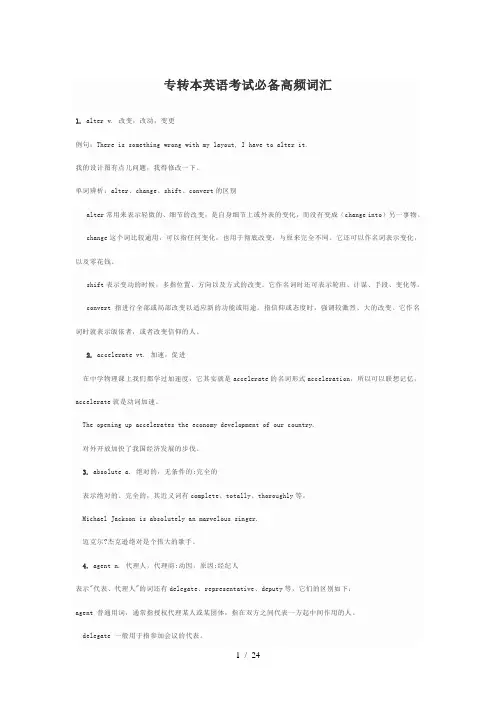
专转本英语考试必备高频词汇1. alter v. 改变,改动,变更例句:There is something wrong with my layout, I have to alter it.我的设计图有点儿问题,我得修改一下。
单词辨析:alter、change、shift、convert的区别alter常用来表示轻微的、细节的改变,是自身细节上或外表的变化,而没有变成(change into)另一事物。
change这个词比较通用,可以指任何变化,也用于彻底改变,与原来完全不同。
它还可以作名词表示变化,以及零花钱。
shift表示变动的时候,多指位置、方向以及方式的改变。
它作名词时还可表示轮班、计谋、手段、变化等。
convert指进行全部或局部改变以适应新的功能或用途。
指信仰或态度时,强调较激烈、大的改变。
它作名词时就表示皈依者,或者改变信仰的人。
2. accelerate vt. 加速,促进在中学物理课上我们都学过加速度,它其实就是accelerate的名词形式acceleration,所以可以联想记忆,accelerate就是动词加速。
The opening up accelerates the economy development of our country.对外开放加快了我国经济发展的步伐。
3. absolute a. 绝对的,无条件的;完全的表示绝对的、完全的,其近义词有complete、totally、thoroughly等。
Michael Jackson is absolutely an marvelous singer.迈克尔?杰克逊绝对是个伟大的歌手。
4. agent n. 代理人,代理商;动因,原因;经纪人表示"代表、代理人"的词还有delegate、representative、deputy等,它们的区别如下:agent 普通用词,通常指授权代理某人或某团体,指在双方之间代表一方起中间作用的人。
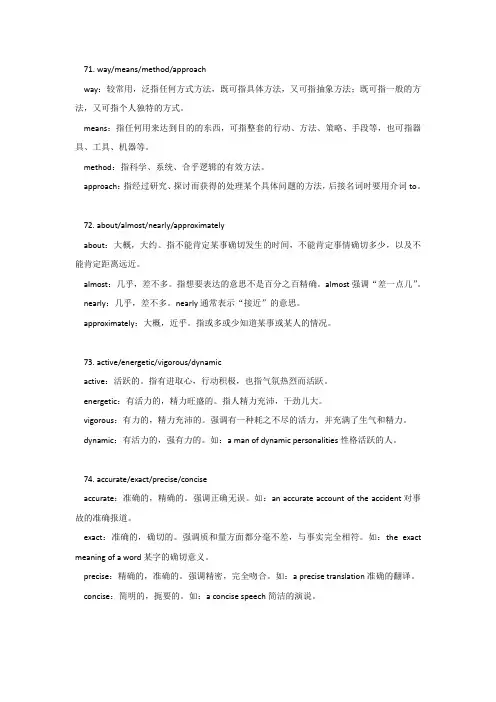
71. way/means/method/approachway:较常用,泛指任何方式方法,既可指具体方法,又可指抽象方法;既可指一般的方法,又可指个人独特的方式。
means:指任何用来达到目的的东西,可指整套的行动、方法、策略、手段等,也可指器具、工具、机器等。
method:指科学、系统、合乎逻辑的有效方法。
approach:指经过研究、探讨而获得的处理某个具体问题的方法,后接名词时要用介词to。
72. about/almost/nearly/approximatelyabout:大概,大约。
指不能肯定某事确切发生的时间,不能肯定事情确切多少,以及不能肯定距离远近。
almost:几乎,差不多。
指想要表达的意思不是百分之百精确。
almost强调“差一点儿”。
nearly:几乎,差不多。
nearly通常表示“接近”的意思。
approximately:大概,近乎。
指或多或少知道某事或某人的情况。
73. active/energetic/vigorous/dynamicactive:活跃的。
指有进取心,行动积极,也指气氛热烈而活跃。
energetic:有活力的,精力旺盛的。
指人精力充沛,干劲儿大。
vigorous:有力的,精力充沛的。
强调有一种耗之不尽的活力,并充满了生气和精力。
dynamic:有活力的,强有力的。
如:a man of dynamic personalities性格活跃的人。
74. accurate/exact/precise/conciseaccurate:准确的,精确的。
强调正确无误。
如:an accurate account of the accident对事故的准确报道。
exact:准确的,确切的。
强调质和量方面都分毫不差,与事实完全相符。
如:the exact meaning of a word某字的确切意义。
precise:精确的,准确的。
强调精密,完全吻合。
如:a precise translation准确的翻译。
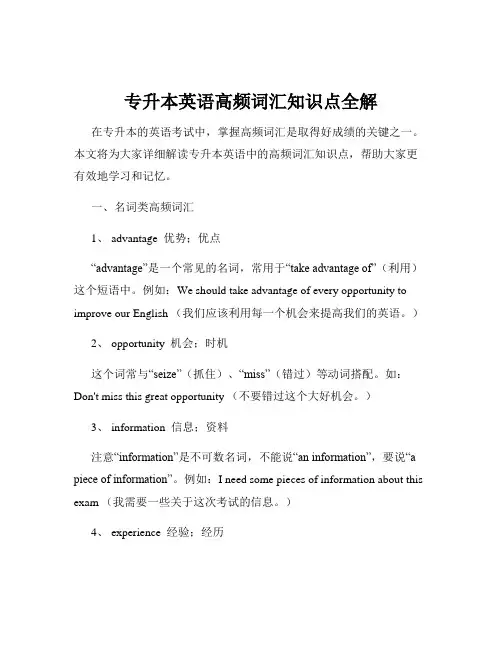
专升本英语高频词汇知识点全解在专升本的英语考试中,掌握高频词汇是取得好成绩的关键之一。
本文将为大家详细解读专升本英语中的高频词汇知识点,帮助大家更有效地学习和记忆。
一、名词类高频词汇1、 advantage 优势;优点“advantage”是一个常见的名词,常用于“take advantage of”(利用)这个短语中。
例如:We should take advantage of every opportunity to improve our English (我们应该利用每一个机会来提高我们的英语。
)2、 opportunity 机会;时机这个词常与“seize”(抓住)、“miss”(错过)等动词搭配。
如:Don't miss this great opportunity (不要错过这个大好机会。
)3、 information 信息;资料注意“information”是不可数名词,不能说“an information”,要说“a piece of information”。
例如:I need some pieces of information about this exam (我需要一些关于这次考试的信息。
)4、 experience 经验;经历当表示“经验”时是不可数名词,当表示“经历”时是可数名词。
比如:He has rich experience in teaching (他在教学方面有丰富的经验。
) She had an interesting experience last week (上周她有一次有趣的经历。
)二、动词类高频词汇1、 achieve 实现;达到常见搭配“achieve one's goal”(实现某人的目标)。
例如:We should work hard to achieve our goals (我们应该努力工作以实现我们的目标。
)2、 improve 改善;提高“improve”可以与“ability”(能力)、“condition”(条件)等词搭配。
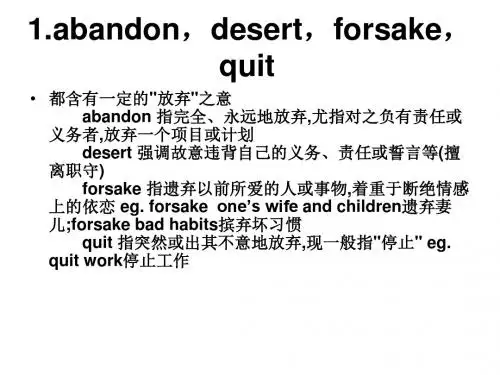
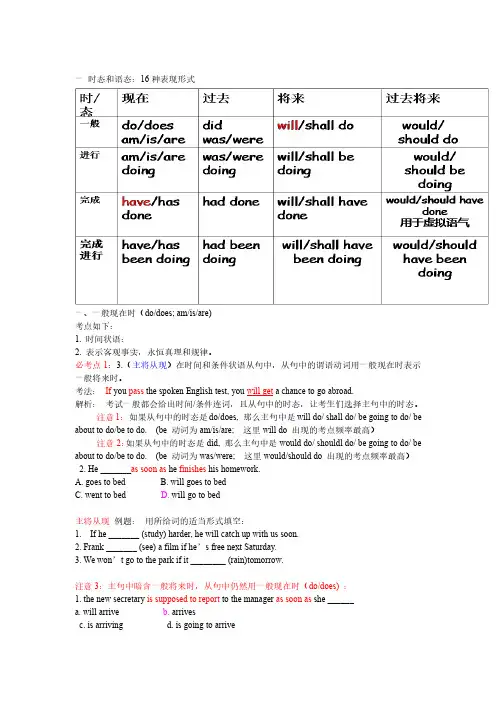
一时态和语态:16种表现形式一、一般现在时(do/does;am/is/are)考点如下:1.时间状语:2.表示客观事实,永恒真理和规律。
必考点1:3.(主将从现)在时间和条件状语从句中,从句中的谓语动词用一般现在时表示一般将来时。
考法:If you pass the spoken English test,you will get a chance to go abroad.解析:考试一般都会给出时间/条件连词,且从句中的时态,让考生们选择主句中的时态。
注意1:如果从句中的时态是do/does,那么主句中是will do/shall do/be going to do/be about to do/be to do.(be动词为am/is/are;这里will do出现的考点频率最高)注意2:如果从句中的时态是did,那么主句中是would do/shouldl do/be going to do/be about to do/be to do.(be动词为was/were;这里would/should do出现的考点频率最高)2.He_______as soon as he finishes his homework.A.goes to bedB.will goes to bedC.went to bedD.will go to bed主将从现例题:用所给词的适当形式填空:1.If he_______(study)harder,he will catch up with us soon.2.Frank_______(see)a film if he’s free next Saturday.3.We won’t go to the park if it________(rain)tomorrow.注意3:主句中暗含一般将来时,从句中仍然用一般现在时(do/does):1.the new secretary is supposed to report to the manager as soon as she______a.will arriveb.arrivesc.is arrivingd.is going to arrive2.---can I join your club,Dad?---you can when you_____a bit older.a.getb.will getc.are gettingd.will have get3.remember to send me a photo of your son next time you_____to me.a.writeb.will writec.are writingd.would write4.If Mr.Smith________back,please let me know.A.will comeesC.cameD.had come必考点2:4.the more...,the more...句型完整句型:The+形容词/副词的比较级+(名词)+主语+谓语,the+形容词/副词的比较级+(名词)+主语+谓语.Eg:The more books he reads,the happier he is.12年真题:18题____she said,_____she got.A.The more the more excitedB.More excitedC.Much the more excitedD.The much excited翻译练习题:1.他越忙就越高兴。
专转本英语单词辨析1.argue dispute quarrel debateargue: 辩论,争论。
指与某人争论,而某人是错误的,使对方信服你使正确的。
dispute: 辩论,争论,对质疑。
指怀疑,某事而进行激烈的争辩。
quarrel: 争吵,吵架。
指大声争吵,埋怨对方无尽无休。
debate: 争辩,辩论。
尤指再公共场合如集会或国会中所进行的辩论。
2. assure ensure insure reassureassure: 使某人相信,向某人保证。
搭配为:assure sb. of sth.或assure sb. that,如:assure safety of the operation 确保手术成功。
ensure:保证,确保。
常用于:ensure that或ensure sth.(如:success, safety, supplies)句型。
insure: 保险,投保。
搭配为:insure against,如:insure one’s house against fire给房子投保了火险。
reassure: 使安心,使放心。
搭配为:reassure sb. about sth. 。
3.agree consent comply approveAgree:同意,答应。
指就做某事取得一致意见。
与介词with连用,指同意某人、某方或某种见解。
有时与介词to连用,指同意某事、赞成某一建议、计划、决定或办法。
consent: 同意。
指答应某人已经提出或可能要你做的事。
consent后接动词to或动词不定式。
comply: 同意。
comply与consent同意comply后接动词to 。
approve: 赞成。
日常用语,指某人、某事是正确的或令人满意的后接介词of4.arise arouse rise raisearise: 产生,出现,发生。
强调事物产生的结果,主要用于问题、困难等不好的事情的产生、发生、出现,不及物动词。
专转本易混易错词归纳1) quite 相当quiet 安静地2)影响, 假装, 影响3)adapt vi适应 vt. adapt to the campus lifeadopt 采用adept adj. 内行beadept/good/profic ient at4) 天使角度5) dairy 牛奶厂diary 日记6) contend v.奋斗, 斗争content n.内容,adj.满足的be content to do /be content with sthcontext n.上下文contest n.竞争, 比赛7) principal n.校长, adj.主要的principle 原则8) 含蓄的明白的9) dessert 甜食desert n.沙漠放弃dissert 论文10) pat 轻拍paton one’s shoulder tap 轻打slap 掌击rap 敲,打11) decent adj.正经的descent n 向下,royal descentdescend v 向下12) sweet 甜的sweat 汗水13) later 后来former/latter 后者latest 最近的最近14) costume 服装custom 习惯15) 广泛的深刻的16) aural 耳的oral 口头的17) abroad 国外aboard 上(船,飞机)18) altar 祭坛alter v.改变19) assent 同意/consent/resent ascent a.上升/ascend v. accent n. 口音20) champion 冠军champagne 香槟酒campaign 战役21) barren 不毛之地的barn n.古仓22) beam 梁,光束bean 豆 Mr.have 过去式领先recede/concede进行,继续exceed24) pray for 祈祷prey n猎物prey on sth 25) chicken 鸡kitchen 厨房26) monkey 猴子donkey 驴27) chore 家务活chord 和弦cord 细绳28) cite v.引用site n.场所sight n.视觉29) clash (金属)幢击声crash 碰幢,坠落crash into/bump against/collide with crush v. 压坏30)compliment n/v 赞美complement n/v.附加物31)confirm v.确认/affirmconform v.使顺从conform to /comply with /abide by /adhere to the rules32) contact n/v接触contact lens contact vt. sb/sth make contact withsbcontract n.合同v.contrast 对照in /by contrast33) council 议会counsel 忠告consul 领事34) crow 乌鸦crown 王冠clown 小丑 cow 牛35) dose 一剂药doze 打盹36) drawn draw 过去分词 drown 溺水37) emigrant 移民到国外immigrant 从某国来的移民38) excess n 超过exceed v超过excel 擅长39) hotel 青年旅社 hostel 旅店40) latitude 纬度altitude 高度gratitude 感激41) immoral 不道德的 immortal 不朽的42) lone 孤独的alone 单独的lonely 寂寞的43) mortal 不死的metal 金属 mental 神经的 medal 勋章model 模特meddle 玩弄44) scare 惊吓scarce缺乏的45) drought 天旱draught 通风, 47) assure 保证ensure 使确定insure 保险48) except 除外expect 期望accept 接受exempt 免除49) floor 地板flour 面粉50) incident 事件accident 意外51)inspiration灵感aspiration 渴望52) march 三月, 前进 match 比赛53) patent 专利potent 有力的potential 潜在的54) police 警察policy 政策politics 政治55) protest抗议protect 保护56) require 需要inquire 询问enquire 询问acquire 获得67) revenge 报仇avenge 为...报仇68) story 故事storey 楼层 store 商店69) strike 打stick 坚持 strict 严格的70) expand 扩张expend 花费extend 延长71) commerce 商业commence 开始72) through 通过thorough 彻底的(al)though 尽管thought think 过去分词73) purpose 目的suppose 假设propose 建议74) expect 期望respect 尊敬aspect 方面inspect 视察suspect 怀疑75) glide 滑翔slide 使滑行 slip 跌落76) steal 偷steel 钢77) strive 努力stride 大步走78) allusion 暗示illusion 幻觉delusion 错觉elusion 逃避79) prospect 前景perspective 透视法80) stationery 文具stationary 固定的81) loose 松的lose 丢失loss n 损失 lost lose过去式82) amend 改正, 修正 emend 校正83) amoral unmoral immoral 同义不道德的84) capitol 大厦capital 首都85) casual 随便的causal 表原因的86) extend 延伸extent 长度extant 现存的87) inability 没能力disability 残疾88) personnel 人事personal 个人的89) statue 塑像statute 法令stature 身长status 地位90) widow 寡妇window 窗户91) socks 短袜stockings 长筒袜92) tax 税taxi 出租93) definite 不定的infinite 无限的94) grim 严酷的grime 污点95) crayon 蜡笔canyon 山谷96) recent 最近resent 生气97) phrase 短语phase 阶段98) mission 使命emission 散发, 发射 mansion 大厦99) vision 视觉version 译本100) gasp 上气不接下气 grasp 抓住101) delicate 微妙的dedicate 献身101) idle 空闲的idol 偶像102) induce 促使,劝诱deduce 推测reduce 减少seduce 诱使103) lapse 流逝elapse 消逝104) rude 粗鲁的crude 天然的105) source 水源sauce 酱油resource 资源recourse 求援106) sled (儿童)雪橇 sledge 雪橇107) stripe 条纹strip 条trip 旅行108) vocation 职业vacation 假期evocation 召集revocation 撤回109) ardor 热情adore 崇拜adorn 装饰110) area 区域era 时代111) resemble 象... assemble v 集合,装配assembly n 集合, 装配112) assume 假定resume 恢复113) attain 达到obtain 获得abstain 放弃114) award 授予reward 奖赏115) baggage (American English) luggage 行李116) badge 徽章bandage 绷带117) blade 刀刃bald 秃的 bold 大胆118) bloom 开花blossom 开花(结果实) bosom 胸口119)blush 脸红flush 发红(脸) 120) bride 新娘bribe 贿赂121) growl 咆哮howl 狼叫122) depress 使沮丧suppress 镇压oppress 压迫123) dime 一角dim 暗淡的124) dizzy 眼花缭乱 dazzle 使眼花125) brown 褐色brow 眼眉 blow 打击126) bullet 子弹bulletin 公告127) carton 纸板盒 cartoon 动画128) chivalry 骑士精神 cavalry 骑兵队129) collar 领子cellar 地窖 color 颜色130) vanish 消失evanish 使消失131) intrude 入侵extrude 逐出detrude 推下132) distort 弄弯retort 反驳133) eminent 杰出的imminent 逼近的134) decline 下降recline 放置incline 倾斜135) exclaim 呼喊proclaim 宣布acclaim 欢呼declaim 朗诵136) edict 法令indict 控告137) perfuse 泼洒profuse 浪费的138) reject 拒绝eject 逐出 inject 注射deject 使沮丧139) literacy 识字literary 文学的literature 文学 literal 文字的140) median 中央的,中线的 medium 媒体141) expel 驱逐repel 反击impel 推动 dispel 驱散142) rip 撕ripe 熟的143) wench 绞车wrench 扭伤144) confidant 知己 confident 有信心的145) dine 吃饭diner 吃饭人dinning n 吃饭dinner 晚饭146) dreg 渣滓drag 拖拉147) faint 失去知觉 feint 佯攻148) imprudence 轻率 impudence 无耻149) specie 硬币species 种类150) suite 一(套,批) suit一套衣服。
专升本词汇考点汇总大全对于准备专升本考试的同学来说,词汇是英语学习的基础,也是考试中取得高分的关键。
下面就为大家详细汇总一下专升本词汇的常见考点。
一、名词名词在专升本考试中出现的频率较高,需要重点掌握其复数形式、所有格以及词义辨析。
1、复数形式一般情况下,直接在名词后加“s”,如“books”“tables”。
以“s”“x”“ch”“sh”结尾的名词,加“es”,如“boxes”“watches”。
以“辅音字母+y”结尾的名词,把“y”改为“i”,再加“es”,如“city cities”“baby babies”。
以“f”或“fe”结尾的名词,把“f”或“fe”改为“v”,再加“es”,如“leaf leaves”“knife knives”。
但也有一些特殊情况,如“roof roofs”“gulf gulfs”。
2、所有格表示有生命的名词的所有格,一般在名词后加“'s”,如“Tom's book”“my father's car”。
以“s”结尾的复数名词的所有格,直接在后面加“'”,如“the students' books”。
表示无生命的名词的所有格,常用“of +名词”的结构,如“the window of the room”。
3、词义辨析要注意一些名词的近义词和反义词,如“job”和“work”,“success”和“failure”等。
还有一些名词在不同语境中有不同的含义,比如“room”,有“房间”和“空间”的意思。
二、动词动词是英语句子的核心,在专升本考试中,动词的时态、语态、非谓语动词等都是重要考点。
1、时态一般现在时:表示经常发生的动作或存在的状态,主语是第三人称单数时,动词要加“s”或“es”。
一般过去时:表示过去发生的动作或存在的状态,动词要用过去式。
一般将来时:表示将来要发生的动作,常用“will +动词原形”或“be going to +动词原形”的结构。
专升本英语丨常考的140组混淆单词1) quite 相当 -- quiet 安静地2) affect v 影响, 假装 -- effect n 结果, 影响3) adapt 适应 -- adopt 采用 --adept 内行4) angel 天使 --angle 角度5) dairy 牛奶厂 --diary 日记6) contend 奋斗, 斗争--content 内容, 满足的context 上下文 --contest 竞争, 比赛7) principal 校长, 主要的 --principle 原则8) implicit 含蓄的 --explicit 明白的9) dessert 甜食 --desert 沙漠 v 放弃--dissert 写论文10) pat 轻拍 --tap 轻打--slap 掌击-rap 敲,打11) decent 正经的 --descent n 向下, 血统 --descend v 向下12) sweet 甜的 --sweat 汗水13) later 后来-- latter 后者 --latest 最近的 --lately adv 最近14) costume 服装 --custom 习惯15) extensive 广泛的 --intensive 深刻的16) aural 耳的--oral 口头的17) abroad 国外 --aboard 上(船,飞机)18) altar 祭坛 --alter 改变19) assent 同意 --ascent 上升 --accent 口音20) champion 冠军 --champagne 香槟酒-- campaign 战役21) baron 男爵--barren 不毛之地的 --barn 古仓22) beam 梁,光束 --bean 豆 --been have 过去式23) precede 领先 --proceed 进行,继续24) pray 祈祷--prey 猎物25) chicken 鸡 --kitchen 厨房26) monkey 猴子-- donkey 驴27) chore 家务活--chord 和弦-- cord 细绳28) cite 引用--site 场所 --sight 视觉29) clash (金属)幢击声--crash 碰幢,坠落 --crush 压坏30) compliment 赞美 --complement 附加物31) confirm 确认 --conform 使顺从32) contact 接触-- contract 合同 --contrast 对照33) council 议会--counsel 忠告 --consul 领事34) crow 乌鸦--crown 王冠 --clown 小丑 --cow 牛35) dose 一剂药--doze 打盹36) drawn draw 过去分词 --drown 溺水37) emigrant 移民到国--immigrant 从某国来的移民38) excess n 超过--exceed v超过 --excel 擅长39) hotel 青年旅社--hostel 旅店40) latitude 纬度--altitude 高度--gratitude 感激41) immoral 不道德的 --immortal 不朽的42) lone 孤独的 --alone 单独的--lonely 寂寞的43) mortal 不死的--metal 金属 --mental 神经的 medal勋章--model 模特--meddle 玩弄44) scare 惊吓--scarce 缺乏的45) drought 天旱 --draught 通风, 拖拉 --draughts (英)国际跳棋46) assure 保证-ensure 使确定 --insure 保险47) except 除外 --expect 期望--accept 接受 --excerpt 选录 --exempt 免除48) floor 地板 --flour 面粉49) incident 事件--accident 意外50) inspiration 灵感 --aspiration 渴望51) march 三月, 前进--match 比赛52) patent 专利 --potent 有力的--potential 潜在的53) police 警察--policy 政策--politics 政治54) protest 抗议--protect 保护55) require 需要 --inquire 询问 --enquire 询问 --acquire 获得56) revenge 报仇--avenge 为...报仇57) story 故事 --storey 楼层 --store 商店58) strike 打--stick 坚持-- strict 严格的59) expand 扩张 --expend 花费--extend 延长60) commerce 商业 --commence 开始61) through 通过 --thorough 彻底的--(al)though 尽管 --thought think 过去分词62) purpose 目的 --suppose 假设 --propose 建议63) expect 期望--respect 尊敬-- aspect 方面-- inspect 视察 --suspect 怀疑64) glide 滑翔 --slide 使滑行--slip 跌落65) steal 偷 --steel 钢66) strive 努力--stride 大步走67) allusion 暗示 --illusion 幻觉--delusion 错觉 --elusion 逃避68) prospect 前景 --perspective 透视法69) stationery 文具--stationary 固定的70) loose 松的--lose 丢失-- loss n 损失-- lost lose过去式71) amend 改正, 修正--emend 校正72) amoral unmoral immoral 同义不道德的73) capitol 大厦--capital 首都74) casual 随便的--causal 表原因的75) extend 延伸 --extent 长度 --extant 现存的76) inability 没能力--disability 残疾77) personnel 人事--personal 个人的78) statue 塑像--statute 法令--stature 身长 ---status 地位79) widow 寡妇 --window 窗户80) socks 短袜 --stockings 长筒袜81) tax 税 --taxi 出租82) definite 不定的 --infinite 无限的83) grim 严酷的 --grime 污点84) crayon 蜡笔 --canyon 山谷85) recent 最近--resent 生气86) phrase 短语 --phase 阶段87) mission 使命--emission 散发, 发射--mansion 大厦88) vision 视觉 --version 译本89) gasp 上气不接下气--grasp 抓住90) delicate 微妙的 --dedicate 献身91) idle 空闲的 --idol 偶像92) induce 促使,劝诱 --deduce 推测 --reduce 减少 --seduce 诱使93) lapse 流逝--elapse 消逝 --eclipse 日食94) rude 粗鲁的--crude 天然的95) source 水源-- sauce 酱油-- saucer 茶托-- resource 资源 --recourse 求援96) sled (儿童)雪橇-- sledge 雪橇97) stripe 条纹-- strip 条-- trip 旅行98) vocation 职业 --vacation 假期 --evocation 召集--revocation 撤回99) ardor 热情 --adore 崇拜--adorn 装饰100) area 区域--era 时代101) resemble 象... --assemble v 集合,装配-- assembly n 集合, 装配102) assume 假定 --resume 恢复103) attain 达到-- obtain 获得 --abstain 放弃104) award 授予--reward 奖赏105) baggage (American English) luggage 行李106) badge 徽章--bandage 绷带107) blade 刀刃--bald 秃的--bold 大胆108) bloom 开花 --blossom 开花(结果实)--bosom 胸口109)blush 脸红--flush 发红(脸)110) bride 新娘--bribe 贿赂111) growl 咆哮 --howl 狼叫112) depress 使沮丧--suppress 镇压 --oppress 压迫113) dime 一角-- dim 暗淡的114) brown 褐色--brow 眼眉--blow 打击115) bullet 子弹 --bulletin 公告116) carton 纸板盒--cartoon 动画117) chivalry 骑士精神--cavalry 骑兵队118) collar 领子--cellar 地窖--color 颜色119) vanish 消失 --evanish 使消失120) intrude 入侵 --extrude 逐出--detrude 推下121) contort 扭弯--distort 弄弯--retort 反驳122) eminent 杰出的--imminent 逼近的123) decline 下降-- recline 放置 --incline 倾斜124) exclaim 呼喊 proclaim 宣布 --acclaim 欢呼--declaim 朗诵125) edict 法令 --indict 控告126) perfuse 泼洒 --profuse 浪费的127) reject 拒绝--eject 逐出--inject 注射 --deject 使沮丧128) literacy 识字--literary 文学的--literature 文学--literal 文字的129) median 中央的,中线的 --medium 媒体130) expel 驱逐 --repel 反击 --impel 推动--dispel 驱散131) rip 撕--ripe 熟的132) wench 绞车 --wrench 扭伤133) confidant 知己 --confident 有信心的134) dine 吃饭-- diner 吃饭人-- dinning n 吃饭 --dinner 晚饭135) dreg 渣滓--drag 拖拉136) faint 失去知觉 --feint 佯攻137) imprudence 轻率--impudence 无耻138) specie 硬币 --species 种类139) hanger 钩子-- hangar 棚厂--hunger 饥饿140) suite 一(宾馆套房)--suit一套衣服。
英语这个磨人的小妖精,背单词已经够烦了,偏偏有些单词长得还那么像,常常让我们搞混,真是傻傻分不清楚,今天为大家替天行道,将这些可恶的单词都列出来,小伙伴们赶紧搞定它!在专升本英语考试中,单词容易错误的常见原因集中在四方面:1、发音非常接近,甚至完全相同,容易导致在被动接受语音信息的时候(不过,这个问题在听听力材料的时候影响会比较大哈~)发生理解误差。
如quite 相当 --quiet 安静地。
2有些词汇,不仅互相之间发音相似或相同,拼写也很接近,容易在练习听写的时候把单词写错。
如dairy 牛奶厂 --diary 日记,以及statue 塑像--statute法令--stature身长--status 地位。
3对于一些发音特殊的词汇,考生总是记不住其正确发音,比如suite 这个单词,很多考生容易把它的发音错误地理解为与suit这个单词相同,因而在听力中发生理解错误。
4有些单词,发音,拼写都接近,而且在含义用法上也有一些联系或雷同之处,因此在听力理解时难度极大。
如 extend 延伸(时间或长度) --extent 长度。
常考易混淆的单词1) quite 相当 -- quiet 安静地2) affect v 影响, 假装 -- effect n 结果, 影响3) adapt 适应 -- adopt 采用 --adept 内行4) angel 天使 --angle 角度5) dairy 牛奶厂 --diary 日记6) contend 奋斗, 斗争--content 内容, 满足的context 上下文 --contest 竞争, 比赛7) principal 校长, 主要的 --principle 原则8) implicit 含蓄的 --explicit 明白的9) dessert 甜食 --desert 沙漠 v 放弃--dissert 写论文10) pat 轻拍 --tap 轻打--slap 掌击-rap 敲,打11) decent 正经的 --descent n 向下, 血统 --descend v 向下12) sweet 甜的 --sweat 汗水13) later 后来-- latter 后者 --latest 最近的 --lately adv 最近14) costume 服装 --custom 习惯15) extensive 广泛的 --intensive 深刻的16) aural 耳的--oral 口头的17) abroad 国外 --aboard 上(船,飞机)18) altar 祭坛 --alter 改变19) assent 同意 --ascent 上升 --accent 口音20) champion 冠军 --champagne 香槟酒-- campaign 战役21) baron 男爵--barren 不毛之地的 --barn 古仓22) beam 梁,光束 --bean 豆 --been have 过去式23) precede 领先 --proceed 进行,继续24) pray 祈祷--prey 猎物25) chicken 鸡 --kitchen 厨房26) monkey 猴子-- donkey 驴27) chore 家务活--chord 和弦-- cord 细绳28) cite 引用--site 场所 --sight 视觉29) clash (金属)幢击声--crash 碰幢,坠落 --crush 压坏30) compliment 赞美 --complement 附加物31) confirm 确认 --conform 使顺从32) contact 接触-- contract 合同 --contrast 对照33) council 议会--counsel 忠告 --consul 领事34) crow 乌鸦--crown 王冠 --clown 小丑 --cow 牛35) dose 一剂药--doze 打盹36) drawn draw 过去分词 --drown 溺水37) emigrant 移民到国--immigrant 从某国来的移民38) excess n 超过--exceed v超过 --excel 擅长39) hotel 青年旅社--hostel 旅店40) latitude 纬度--altitude 高度--gratitude 感激41) immoral 不道德的 --immortal 不朽的42) lone 孤独的 --alone 单独的--lonely 寂寞的43) mortal 不死的--metal 金属 --mental 神经的 medal勋章--model 模特--meddle 玩弄44) scare 惊吓--scarce 缺乏的45) drought 天旱 --draught 通风, 拖拉 --draughts (英)国际跳棋46) assure 保证-ensure 使确定 --insure 保险47) except 除外 --expect 期望--accept 接受 --excerpt 选录--exempt 免除48) floor 地板 --flour 面粉49) incident 事件--accident 意外50) inspiration 灵感 --aspiration 渴望51) march 三月, 前进--match 比赛52) patent 专利 --potent 有力的--potential 潜在的53) police 警察--policy 政策--politics 政治54) protest 抗议--protect 保护55) require 需要 --inquire 询问 --enquire 询问 --acquire 获得56) revenge 报仇--avenge 为...报仇57) story 故事 --storey 楼层 --store 商店58) strike 打--stick 坚持-- strict 严格的59) expand 扩张 --expend 花费--extend 延长60) commerce 商业 --commence 开始。
1. clothes, cloth, clothingclothes 统指各种衣服,谓语动词永远是复数;cloth 指布,为不可数名词;clothing 服装的总称,指一件衣服用a piece of, an article of2. incident, accidentincident 指小事件;accident 指不幸的事故,例:He was killed in the accident.3. amount, numberamount 后接不可数名词;number 后接可数名词,例:a number of students4. family, house, homehome 家,包括住处和家人;house 房子,住宅;family 家庭成员,例:My family is a happy one.5. sound, voice, noisesound 自然界各种各样的声音;voice 人的嗓音;noise 噪音,例:I hate the loud noise outside.6. photo, picture, drawingphoto 用照相机拍摄的照片;picture 可指相片,图片,电影片,例:Let's go and see a good picture.drawing 画的画。
7. vocabulary, wordvocabulary 词汇,一个人拥有的单词量,例:He has a large vocabulary.word 具体的单词。
8. population, peoplepopulation 人口,人数,例:China has a large population.people 具体的人。
9. weather, climateweather 一天内具体的天气状况;climate 长期的气候状况,例:The climate here is not good for you.10. road, street, path, wayroad 具体的公路,马路,例:take this roadstreet 街道,例:in the streetpath 小路,小径;way 道路,途径,例:Show me the way to the museum.11. course, subjectcourse 课程(可包括多门科目),例:a summer coursesubject 科目(具体的学科)12. custom, habitcustom 传统风俗,习俗,也可指生活习惯,后接to do;habit 生活习惯,习惯成自然,后接of doing. 例:I've got the habit of drinking a lot.13. cause, reasoncause 指造成某一事实或现象的直接原因,后接of sth./doing sth;reason 用来解释某种现象或结果的理由,后接for sth./doing sth. 例:the reason for being late14. exercise, exercises, practiceexercise 运动,锻炼(不可数);exercises 练习(可数);practice(反复做的)练习,例:Practice makes perfect.15. class, lesson作“课”解时,两者可以替换。
指课文用lesson,例:Lesson 6,第6课;指班级或全体学生用class,例:Class 5,5班。
16. speech, talk, lecturespeech 指在公共场所所做的经过准备的较正式的演说;talk 日常生活中的一般的谈话,讲话;lecture 学术性的演讲,讲课,例:a series of lecture on…17. officer, officialofficer 部队的军官,例:an army officerofficial 政府官员。
18. work, job二者均指工作。
work 不可数;job 可数,例:a good job19. couple, paircouple 主要指人或动物;pair 多指由两部分组成的东西,例:a pair of trousers20. country, nation, state, landcountry 侧重指版图,疆域;nation 指人民,国民,民族;state 侧重指政府,政体;land 国土,国家,例:The whole nation was sad at the news.21. cook, cookercook 厨师,例:He is a good cook.cooker 厨具。
22. damage, damagesdamage 不可数名词,损害,损失;damages 复数形式,赔偿金,例:$900 damages23. police, policemanpolice 警察的总称,后接复数谓语动词,例:The police are questioning everyone in the house.policeman 指某个具体的警察。
24. problem, questionproblem 常和困难连系,前面的动词常为think about, solve, raise;question 常和疑问连系,多和ask, answer连用。
25. man, a manman 人类;a man 一个男人,例:Man will conquer nature.26. chick, chicken二者均可指小鸡,chicken还可以当鸡肉;例:The chicken is delicious.27. telegram, telegraph当电报解时,telegram指具体的;例:a telegramtelegraph指抽象的;例:by telegraph28. trip, journey, travel, voyagetravel 是最常用的;trip 指短期的旅途;例:a three-day tripjourney 指稍长的旅途;voyage 指海上航行。
29. sport, gamesport 多指户外的游戏或娱乐活动,如打球,游泳,打猎,赛马等;例:His favorite sport is swimming.game 指决定胜负的游戏,通常有一套规则。
30. price, prizeprice 价格;例:The price is high/low.prize 奖,奖品,奖金;例:win the first prize31. a number of, the number ofa number of 许多,谓语动词用复数;the number of………的数目,谓语动词用单数。
例:The number of students is increasing.32. in front of, in the front ofin front of 范围外的前面;in the front of 范围内的前面例:In the front of the room sits a boy.33. of the day, of a dayof the day 每一天的,当时的,当代的,例:a famous scientist of the day;of a day 暂时的,不长久的。
34. three of us, the three of usthree of us 我们(不止三个)中的三个;the three of us 我们三个(就三个人)例:The three of us - Tom, Jack and I went to the cinema.35. by bus, on the busby bus 表手段,方式,不用冠词,例:They went there by bus.on the bus 表范围。
36. for a moment, for the momentfor a moment 片刻,一会儿,例:Thinking for a moment, he agreed.for the moment 暂时,一时。
37. next year, the next yearnext year 将来时间状语;the next year 过去将来时间状语,例:He said he would go abroad the next year.38. more than a year, more than one yearmore than a year 一年多;more than one year 超过一年(两年或三年等)。
39. take advice, take the(one's) advicetake advice 征求意见;take the advice 接受忠告例:He refused to take the advice and failed again.40. take air, take the airtake air 传播,走漏;take the air 到户外去,散步例:We take the air every day.41. in a word, in wordsin a word 总之,一句话,例:In a word, you are right.in words 口头上。
42. in place of, in the place ofin place of 代替;in the place of 在…地方,例:A new building is built in the place of the old one.43. in secret, in the secretin secret 秘密地,暗自地,偷偷地,一般用作状语;in the secret 知道内情,知道秘密,一般用作表语,例:My mother was in the secret from the beginning.44. a girl, one girla girl 可泛指所有女孩;one girl 一个女孩,例:Can one girl carry such a big box?45. take a chair, take the chairtake a chair 相当于sit down坐下;take the chair 开始开会。
46. go to sea, by seago to sea 当海员,出航;by sea 乘船,由海路;by the sea 在海边。
47. the doctor and teacher, the doctor and the teacherthe doctor and teacher 指一个人,既是医生又是老师;the doctor and the teacher 两个人,一个医生和一个老师。